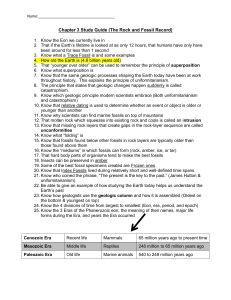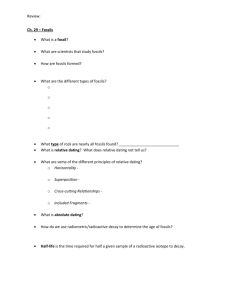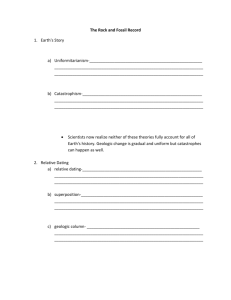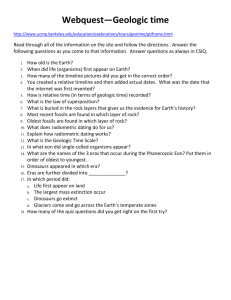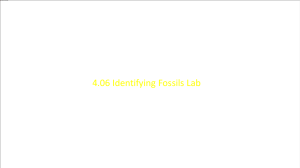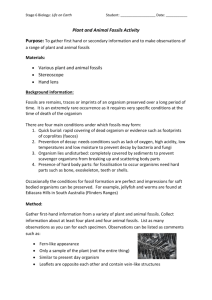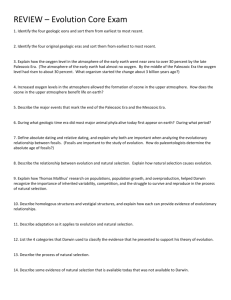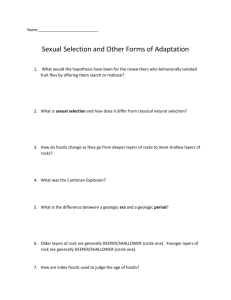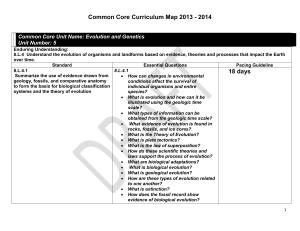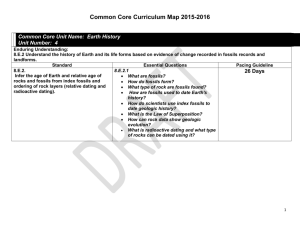HOMEWORK GEOLOGIC TIME NAME: ______1. Based on the
advertisement
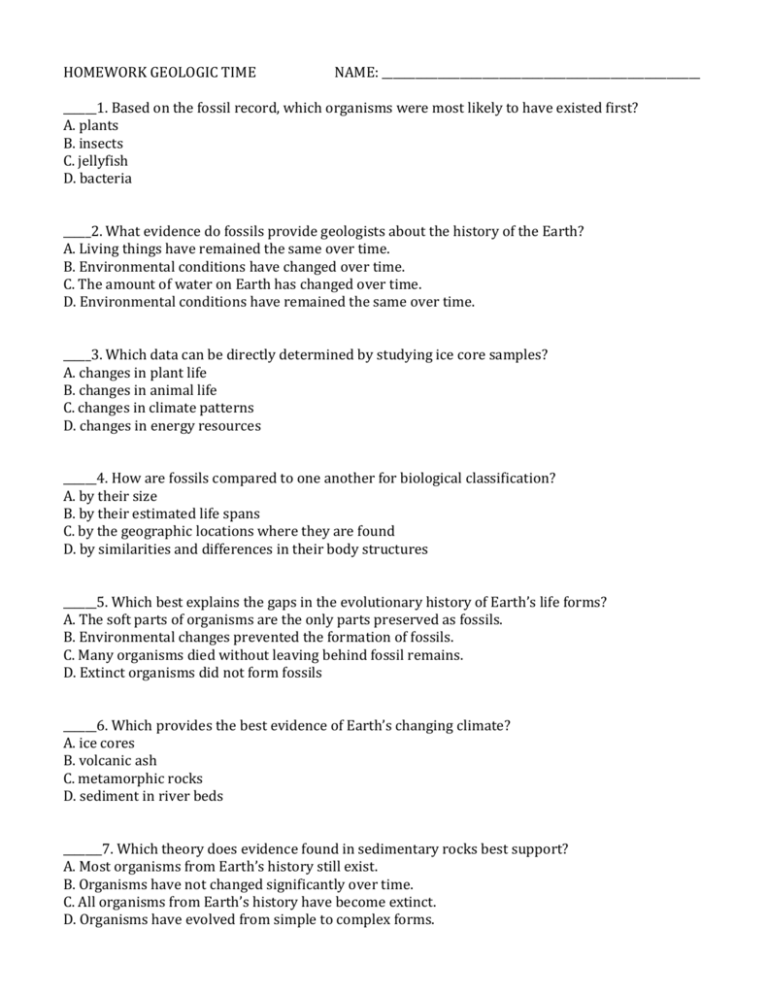
HOMEWORK GEOLOGIC TIME NAME: _________________________________________________________ ______1. Based on the fossil record, which organisms were most likely to have existed first? A. plants B. insects C. jellyfish D. bacteria _____2. What evidence do fossils provide geologists about the history of the Earth? A. Living things have remained the same over time. B. Environmental conditions have changed over time. C. The amount of water on Earth has changed over time. D. Environmental conditions have remained the same over time. _____3. Which data can be directly determined by studying ice core samples? A. changes in plant life B. changes in animal life C. changes in climate patterns D. changes in energy resources ______4. How are fossils compared to one another for biological classification? A. by their size B. by their estimated life spans C. by the geographic locations where they are found D. by similarities and differences in their body structures ______5. Which best explains the gaps in the evolutionary history of Earth’s life forms? A. The soft parts of organisms are the only parts preserved as fossils. B. Environmental changes prevented the formation of fossils. C. Many organisms died without leaving behind fossil remains. D. Extinct organisms did not form fossils ______6. Which provides the best evidence of Earth’s changing climate? A. ice cores B. volcanic ash C. metamorphic rocks D. sediment in river beds _______7. Which theory does evidence found in sedimentary rocks best support? A. Most organisms from Earth’s history still exist. B. Organisms have not changed significantly over time. C. All organisms from Earth’s history have become extinct. D. Organisms have evolved from simple to complex forms. ________8. The diagram shows carbon dioxide levels preserved in an ice core. Which layer of the ice core shows the highest concentration of carbon dioxide in the atmosphere? A. 1 B. 2 C. 3 D. 4 ______9. How can scientists best determine when an ancient species became extinct? A. by analyzing the DNA of the species B. by examining existing species with similar traits C. by studying the history of meteor collisions with Earth D. by organizing the rock layers in which the fossils were found ______10. Scientists studying a geologic site found tropical plant fossils in a lower rock layer and fossils of woolly mammoths, also called tundra mammoths, above the layer. Which is the most likely conclusion? A. The woolly mammoths lived before the tropical plants. B. The tropical plants became extinct due to global climate change. C. The tropical plants were the major food source for the woolly mammoths. D. The woolly mammoths lived in tropical climates as well as cold climates. ________11. The level of carbon dioxide in an ice core is higher at the top than farther down. What can most likely be determined from this? A. A catastrophic event occurred. B. The landmass moved further toward the equator. C. There was a global cooling period followed by a global warming period. D. There was a global warming period followed by a global cooling period. _______12. An ice core shows increasing levels of carbon dioxide over the last 100 years. Which best explains the high levels of carbon dioxide found in the ice core? A. Temperatures over the last century have been growing colder. B. Temperatures over the last century have been growing warmer. C. The region was covered by seawater at some time in the last century. D. The region has received higher amounts of precipitation over the last century. _________13. Place the following in order from longest division in geologic time to shortest. A. era, eon, period, epoch c. epoch, era, period, eon B. eon, era, period, epoch d. epoch, period, era, eon _________14. Which happened first? a. Rise of the mammals and birds b. First fish appear c. Fish adapt to living in rivers and freshwater for the first time d. Dinosaurs dominate the land _______15. What happened at the end of the Mesozoic Era that led to a mass extinction? a. a large asteroid struck the Earth near the Yukotan Peninsula b. a large chain of volcanoes erupted in Eurasia c. the sun’s rays were blocked for an extended period and that led to a global climate shift d. All the above _______16. The earliest part of Earth’s history is called the A. B. C. D. Cenozoic Cambrian Holocene Precambrian _______17. Which is the most likely reason scientists would want to analyze the air trapped in an ice core? A. to study how much oxygen was in the ice B. to learn how the atmosphere changed over time C. to determine how many gas bubbles were present in the air D. to study how many animals lived on Earth when the ice was formed _______18. Which part of Earth’s history is best shown by analysis of ice cores? A. changes in climate B. changes in plant growth C. changes in the amounts of precipitation D. changes in the formation of rock layers _______19. Where is evidence most often found to represent a record of Earth’s history? A. air, lava, and fossils B. water, air, and rocks C. lava, water, and ice cores D. rocks, fossils, and ice cores ______20. Where would fossilized evidence of unicellular organisms most likely be found? A. in the deserts of Africa B. on the surface of a mountain C. in the oceans near the equator D. buried deep within layers of rock _____ 21. Which division of the geologic time scale is the longest? A. eon B. period C. era D. epoch ______ 22. How do scientist know when a mass extinction took place A. they find more fossils of plants B. they find fossils of animals that died suddenly C. they find a disappearance of many fossil species D. they find evidence of changes in Earth’s atmosphere ______ 23. Which of these groups appeared on Earth most recently A. reptiles B. amphibians C. mammals D. fish 24. Place the following items in order from oldest (1) to most recent(4) by writing a number in the blank beside each. ________ Mesozoic Era ________ Precambrian Time _________ Cenozoic Era _____ Paleozoic Era 25. How did photosynthesis lead to the development of animals living on land?
